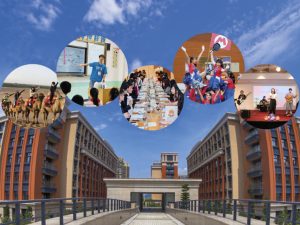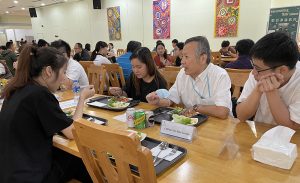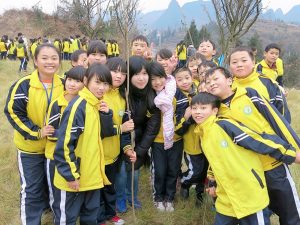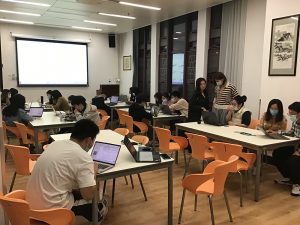A new academic year has begun. The campus is bustling with activity as new students arrive in droves. If you are new to the University of Macau (UM), maybe you can’t wait to start classes, join a student organisation, go to the gym, or meet new friends. But there is one more element in your university life that will make it vastly different from your life in high school— the residential college experience. In this issue, we will give newcomers a peep into what life is like in the RCs. Three students currently living in the RCs will also share their experiences to help new students settle into university life more quickly.
Living and Learning Together
After relocating to its new campus in 2014, UM began adopting a holistic education system based on a residential college system, with ten colleges currently in operation. Each RC is a multicultural and interdisciplinary learning platform that complements the faculty-based system. Each college is home to between 450 and 500 students from different nations. These students live and learn together and develop various skills under the guidance of the college master and resident fellows.
RCs are different from regular dormitories in that they provide students with a holistic education through experiential classes, activities, and frequent opportunities for peer interaction. This living-and-dining-together arrangement is designed to encourage students in the same RC to share meals together, to get to know each other better, and to learn from each other. The High Table Dinner is also an important feature of the RC life and serves an educational purpose. Many students meet their good friends in the RC and it is not uncommon for students to come up with business ideas based on casual conversations. For example, three graduates of Cheng Yu Tung College (CYTC) started their own business during their university years and have now founded a craft beer brewery in Macao, fulfilling their entrepreneurial dreams as a team and contributing to the diversification of Macao’s economy.
Last year, Rita Lei, a third-year primary education major, participated in the ‘Lunch with Professors’ activity at Shiu Pong College, where she chatted with professors from different disciplines. During lunch, Lei took the opportunity to ask Cheng Chun Wai, an associate professor in the Faculty of Education (FED), for advice. ‘Prof Cheng was very patient in answering my questions about career planning and encouraged me to improve handwriting because he thought it would be good for teachers to set an example for their students by writing well,’ she says.
Lei is actively involved in organising and participating in activities. She is a student leader of her RC’s House Association and RC Ambassador Programme, and a member of the Board of Directors of the UM Students’ Union. ‘Apart from the activities organised by each RC, there are also many other activities for new students to choose from according to their interests. By joining these activities, they can gain a lot of knowledge beyond their areas of expertise,’ says Lei. ‘For example, I was the host of the college’s high table dinner once. I spent a lot of time rehearsing beforehand, but it was totally worth it as it helped me become a more confident and eloquent public speaker. Organising events has also sharpened my people skills.’
Cultivating Good Character Traits through Community Service
Apart from helping students develop soft skills, RCs are also dedicated to cultivating good character traits in students. To this end, RCs encourage students to be involved in a wide range of activities, either as participant or organiser. These activities include high table dinners, dean’s dinners, lectures, interest groups, exchange visits, community service, language gatherings, entrepreneurship training, debates, sports competitions, cheerleading competitions, and talent competitions. Students who actively participate in these activities will be able to achieve competency in seven areas by the time they graduate. These include Responsible Citizenship, Global Competitiveness, Knowledge Integration, Teamwork and Collaboration, Service and Leadership, Cultural Engagement, and Healthy Lifestyle.
RCs often organise volunteer teaching trips in the summer and winter holidays to help students grow into caring and socially responsible citizens. Valerie Chan moved into the Henry Fok Pearl Jubilee College in her freshman year. She is now a postgraduate student in the Master of Arts in Second Language Acquisition programme, also serving as a resident tutor to provide guidance to students in organising volunteer teaching trips. ‘I was so excited to start my university life, and I couldn’t wait to get involved in activities such as volunteer teaching,’ she says. ‘I met many like-minded friends in the process of organising the volunteer teaching activities. We prepared classes together and brainstormed ways to introduce Macao to children in remote mountainous areas.’
Teaching English in primary schools in mountainous areas in Guizhou and Yunnan has not only allowed Chan to gain a deeper understanding of poor areas in the country; it has also inspired her to contemplate the meaning of life. ‘I have seen children in the mountains trying to grasp every opportunity to learn despite the lack of resources. That was truly a humbling experience. If those children can face the challenges in their daily lives with a positive and optimistic attitude, what excuse do I have not to?’ says Chan. ‘More importantly, I have had the opportunity to use my knowledge to serve people in different communities through the volunteer activities organised by the university, and this will have a profound impact on my future life.’ After graduation from college, Chan plans to continue to fulfil her civic duty and give back to society.
Benefits of the Tutorial Programme
Each RC is like a home, where teachers and students care about each other deeply. The RC provides students with care, guidance, emotional support, academic and career counselling, and education in core values and character traits. The RC also offers tutorials in collaboration with different faculties and departments.
In the 2020/2021 academic year, the college offered tutorial courses on topics such as data science, philosophy, health science, and academic English. In the last academic year, CYTC and the Faculty of Social Sciences (FSS) jointly organised a residential college academic tutorial programme, titled ‘The Basics of Big Data Analysis’, which was taught by FSS Associate Professor Li Tao. Ashley Fang, a second-year student in the FSS, participated in the programme because she knew that data analysis skills are very useful in social sciences. She was initially a little worried that as a liberal arts student, she would struggle with programming languages, but was delighted with the results. ‘The programming skills taught in this programme were very practical and I was able to use them to process data in a required course during the last semester, which was very effective,’ she says. This activity has stimulated her interest in data analysis, and she has continued to explore online resources after completing the programme. As a result of her outstanding performance, she was invited by the RC’s Associate Master, Dr Gong Yingxue, to be the coordinator of the next semester’s programme to help guide new students.
Source: My UM ISSUE 105


Rita Lei (3rd from right) asks FED professor Cheng Chun Wai (2nd from right) for advice during the ‘Lunch with Professors᾽ activity

Volunteer teaching trips have inspired Valerie Chan (centre) to contemplate the meaning of life

In the last academic year, CYTC and FSS jointly organised a residential college academic tutorial programme, titled ‘The Basics of Big Data Analysis’.
